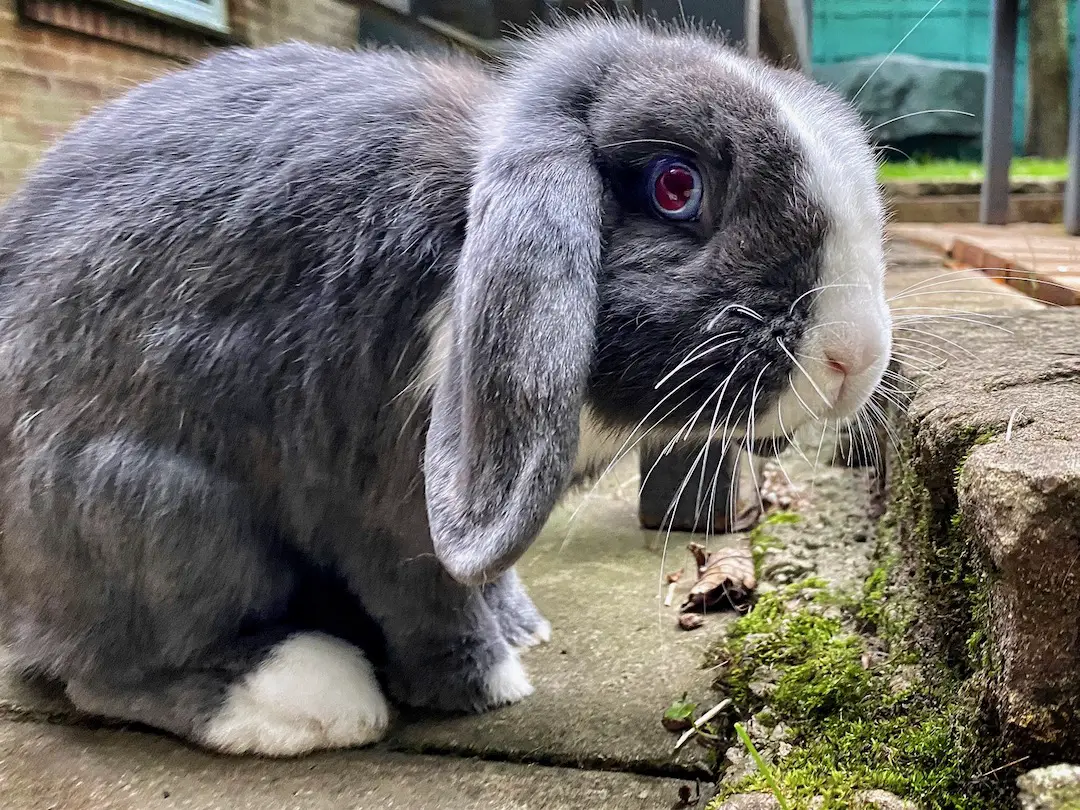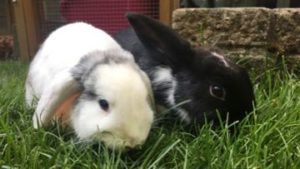When you go to the supermarket and pick up a tin of soup (or a sandwich, or a pizza…) you can check what the ingredients are. And (at least in the UK), you’ll also usually be told how much this food provides of your recommended daily allowance, also called your reference intake.
It’s handy – you can check if you’re likely to be eating too much salt, or if this will help towards enough vitamin C.
Wouldn’t it be great if we could get some of that information for rabbits?
So I did some research to find out what the recommended daily allowance is for pet rabbits – how much vitamins, minerals, calories and other nutrients bunnies need, and why they need them. Here’s what I found – I hope you find it helpful.
What nutrients do rabbits need?
Rabbits need the following nutrients: fibre, protein, small amounts of fat, a variety of minerals (but not too much, especially of calcium), and vitamins A, D and E. Bunnies don’t need any of the vitamin B complex, and rabbits also don’t need any extra vitamin C. A 2kg (4.4lb) adult bunny needs about 168kcal a day. A diet of hay, fresh greens and water supplies all these nutrients. Read on for more detailed information on each nutrient.
| Nutrient | Recommended daily allowance per kg of feed for adult rabbit | Recommended daily allowance per kg of feed for growing rabbit | Safe upper limit of nutrient per kg of feed |
|---|---|---|---|
| Crude fibre | 140-250g | 140-160g | |
| Fat | 25-50g | 30-50g | |
| Starch | <200g | <135g | |
| Protein | 120-170g | 150-180g | |
| Macro-minerals | |||
| Calcium | 5g | 5g | 10g |
| Phosphorus | 4g | 4g | 9g |
| Sodium | 1g | 1-2g | 8g |
| Magnesium | 0.3-3g | 0.4-0.7g | 3.5g |
| Potassium | 6g | 2-6g | 16g |
| Chloride | 1.7g | 1-5g | 4.8g |
| Micro-minerals | |||
| Copper | 5-20mg | 3-6mg | 25mg |
| Zinc | 50-150mg | 40mg | |
| Manganese | 8-15mg | 20-40mg | 75mg |
| Iron | 30-400mg | 100mg | |
| Iodine | 0.4-0.5mg | 2mg | |
| Selenium | 0.05-0.32mg | 0.1mg | |
| Cobalt | 0.25mg | 0.1-1mg | |
| Vitamins – fat soluble | |||
| Vitamin A | 10,000-12,000 IU | 6,000-10,000 IU | |
| Vitamin D | 800-1,000 IU | 500 IU | 2,000 IU |
| Vitamin E | 50-160mg | 50mg | |
| Vitamin K | 1-2mg | ||
| Vitamins – water soluble | |||
| Vitamin B complex (Thiamin/B1,Riboflavin, Niacin, Biotin, Pantothenic Acid, Pyridoxine/B6, Folic Acid, B12, Choline) | Not required (rabbit’s body manufactures these) | Not required (rabbit’s body manufactures these) | |
| Vitamin C (ascorbic acid) | Not required (rabbit’s body manufactures these) | Not required (rabbit’s body manufactures these) | 2,000mg |
How many calories does a rabbit need?
An adult pet rabbit of about 2kg (4.4lb) needs 168kcal daily to maintain their weight. Growing rabbits need roughly double the calorie intake of mature rabbits. The following table gives values for different weights.
| Weight of rabbit (kg) | Weight of rabbit (lb) | Daily energy requirement for adult rabbit (kcal) | Daily energy requirement for growing rabbit (kcal) |
|---|---|---|---|
| 0.5 | 1.1 | 59 | 118 |
| 1 | 2.2 | 100 | 200 |
| 1.5 | 3.3 | 136 | 272 |
| 2 | 4.4 | 168 | 336 |
| 2.5 | 5.5 | 199 | 398 |
| 3 | 6.6 | 228 | 456 |
| 3.5 | 7.7 | 256 | 512 |
| 4 | 8.8 | 283 | 566 |
Some of you may prefer this in graph form (this also goes to higher weights, if you have a large rabbit breed like a Flemish Giant, which can reach 10kg).
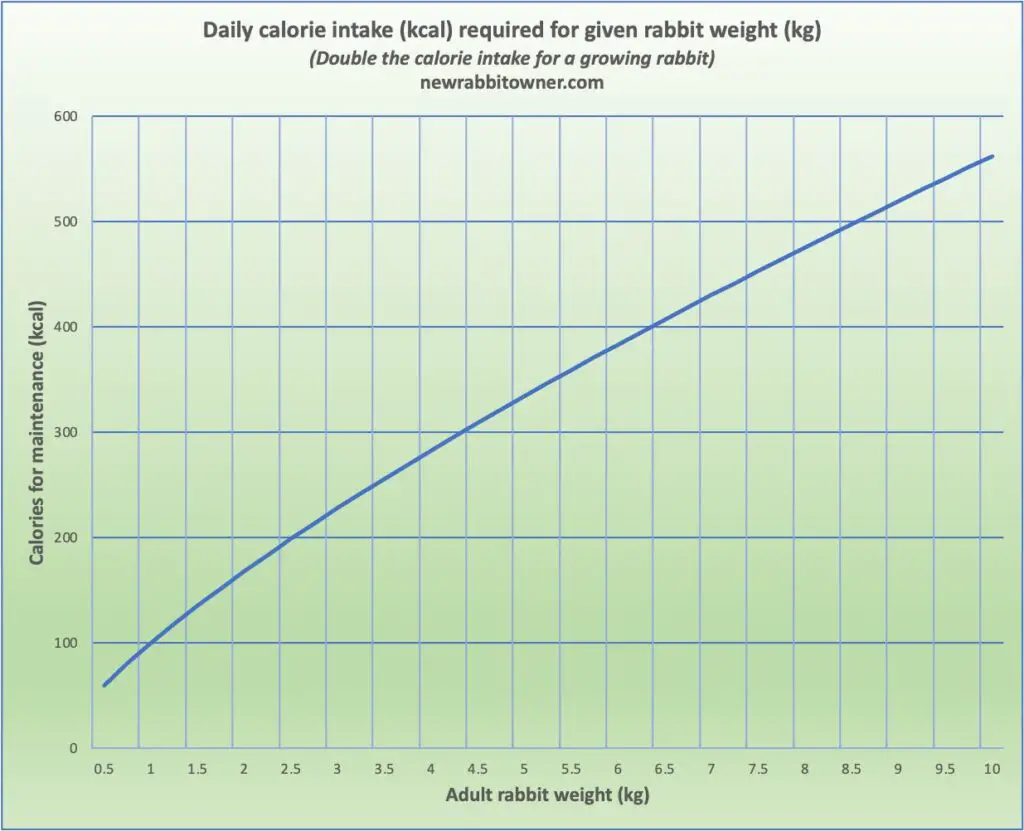
These figures are all for the metabolisable energy. That’s the energy in feed that the rabbit actually uses. It’s the energy in the feed minus the energy that gets pooped out and minus the energy that’s in urine.
Why do rabbits need protein?
Rabbits need protein to build their muscles, other parts of the body, and enzymes which their bodies use. Rabbits (like other mammals) use chemicals called amino acids to make the proteins they need. They get these amino acids from breaking down proteins in food they eat. If a rabbit can’t make enough of the right proteins, it will struggle to grow and be healthy.
Rabbits need ten amino acids (so called ‘essential’) that their bodies can’t make themselves:
- arginine
- histidine
- leucine
- methionine
- lysine
- isoleucine
- phenylalanine
- tryptophan
- threonine
- valine
Rabbits also need these in the right balance. Their bodies can’t store proteins (they are broken down quickly and the excess turned into glucose or fat), so getting both the balance and enough amino acids is important.
Ever wondered why a pure cereal diet isn’t good for rabbits? Besides not being good for their teeth (important for all sorts of health reasons), cereals don’t have much lysine or methionine. Without these two amino acids, your bunny will struggle to grow or stay healthy.
Diets intended for other animals (especially dogs or cats) are unsuitable for rabbits partly because carnivores need a different balance of amino acids from rabbits in their diet.
The need for these amino acids also explains why mixing up the diet with some fresh greens (and an occasional treat) is a good idea for feeding rabbits.
Providing a variety of greens increases the variety of amino acids in the diet, ensuring your bunny can make all the muscles, tissue cells and enzymes that they need to be healthy and happy.
Why do rabbits need fibre?
Just like humans, rabbits need fibre in their diet to help food move down the intestines before it is pooed out. But bunnies need a lot more fibre (for their size) than we do.
The digestive system of rabbits is sensitive – without enough fibre, it clogs up. The fibre helps keep everything moving through.
While in a human constipation might be uncomfortable, for a rabbit it can be fatal. The condition is called ‘gastrointestinal stasis’. If you suspect your bunny may have this, contact a vet immediately.
Fibre is also good for your bunny’s teeth. Rabbit teeth never stop growing. Every week, another 3mm long. But eating high fibre diets like hay helps wear the teeth down, so they stay the same size.
Without enough fibre, the teeth grow faster than the rabbit can grind them down.
And long teeth is really bad for your rabbit. It can lead to breathing difficulties, as the teeth affect the nasal cavities. And the teeth can develop sharp points (spurs) that aren’t smoothed down, leading to pain for your rabbit.
This then leads to more problems, as the rabbit starts using the other side of their mouth, which then affects the muscles and ligaments around the mouth.
In other words, make sure your rabbit has enough fibre (for example by using Timothy hay – find out more here). It’s good for their gut and good for their teeth.
Why do rabbits need fat?
Rabbits need energy for their bodies – and fats are high in energy (there’s over twice as much energy in fat compared to the same weight of carbohydrates).
Bunnies also need fats to help absorb some of the vitamins they need. Vitamins A, D, E & K are all soluble (they dissolve) in fats, so having a little fat in the diet helps the body to get these essential vitamins.
People who show bunnies also like a little fat in the diet as it is said to make the coats shinier.
While having some fat is good, too much fat leads to problems (just as it does in humans!). If bunnies eat too much, and can’t use all the energy, they store it in their bodies (as fat). So just like us, too much fatty food can lead to obesity.
Why is too much starch bad for rabbits?
Too much starch is bad for rabbits because it can be bad for their intestines which can lead to serious problems. It can also lead to your bunny becoming too fat, which can cause longer term health problems.
Starch is a form of carbohydrate – one of the energy sources for rabbits. However, it needs to be kept in balance with the amount of fibre in the diet of rabbits.
Too much starch leads to a ‘starch overload’. This is when there is too much starch in the intestines.
Rabbits can then develop enteritis. Symptoms of enteritis include constipation and the rabbit going off their food. This is followed by watery diarrhoea, and then further diarrhoea and dehydration.
Enteritis can be extremely dangerous for rabbits – even fatal. So if you suspect your rabbit is suffering from this, get in touch with a vet as soon as possible.
Rabbits are most likely to get a starch overload if fed a high grain diet without enough fibre. The easiest way to avoid this is to make sure that the main component of your bunny’s diet is fresh hay (with plenty of drinking water, and some greens).
Why do rabbits need macro-minerals (calcium, sodium and others)?
Rabbits need some minerals in relatively large quantities (grams per day instead of milligrams per day). These include calcium, sodium, magnesium, phosphorus and potassium. Because they are needed in larger quantities than others, they are called macro-minerals.
Rabbits need macro-minerals for bones, energy metabolism, muscle metabolism, blood regulation and a host of other needs.
Why do rabbits need calcium? And can rabbits have too much calcium?
Rabbits need calcium to create bones. Bones are a mixture of collagen (a protein) and calcium phosphate (which helps make bones hard). Growing bunnies need more calcium than mature rabbits, as their bodies and bones are still growing.
If female rabbits are pregnant or feeding their young, then they will also need more calcium (rabbit milk is particularly rich in calcium).
Rabbits also need calcium for a range of other purposes. Calcium is involved in how muscles contract, in how blood clots, and in making sure that the balance of electrolytes in the body is right.
But rabbits can easily have too much calcium. The more you give rabbits calcium in the diet, the more their bodies absorb it, whether they need it or not.
That means that if they have too much, they need to pee it out. If you see white, chalky stuff, it might be because your bunny has too much calcium.
And long term this can lead to health problems. Anyone who has ever had kidney stones will tell you how painful they are (these are little lumps of calcium oxalate that get trapped in the urinary system). Rabbits can get the equivalent of kidney stones too (urolithiasis), and it is just as painful for them.
That’s why you need to be careful and make sure your bunny does not have too much calcium (for instance, alfalfa hay is too high in calcium for a mature rabbit – timothy hay is much better, having only a third as much calcium as alfalfa).
Why do rabbits need phosphorus?
Rabbits need phosphorus in their diet to help build bones – a major part of bones is calcium phosphate. Generally, bunnies need about two-thirds to half the amount of phosphorus compared to calcium.
Why do rabbits need sodium and potassium?
Rabbits need sodium and potassium to help ensure that there’s the right amount of fluids in the bunny’s body. They balance out the fluids in the cells with the fluid around them. Sodium and potassium work together as electrolytes.
Bunnies also need potassium and sodium for passing nerve signals along the bodies. Molecular pumps in our cells move potassium onto one side of a cell wall, and sodium on the other.
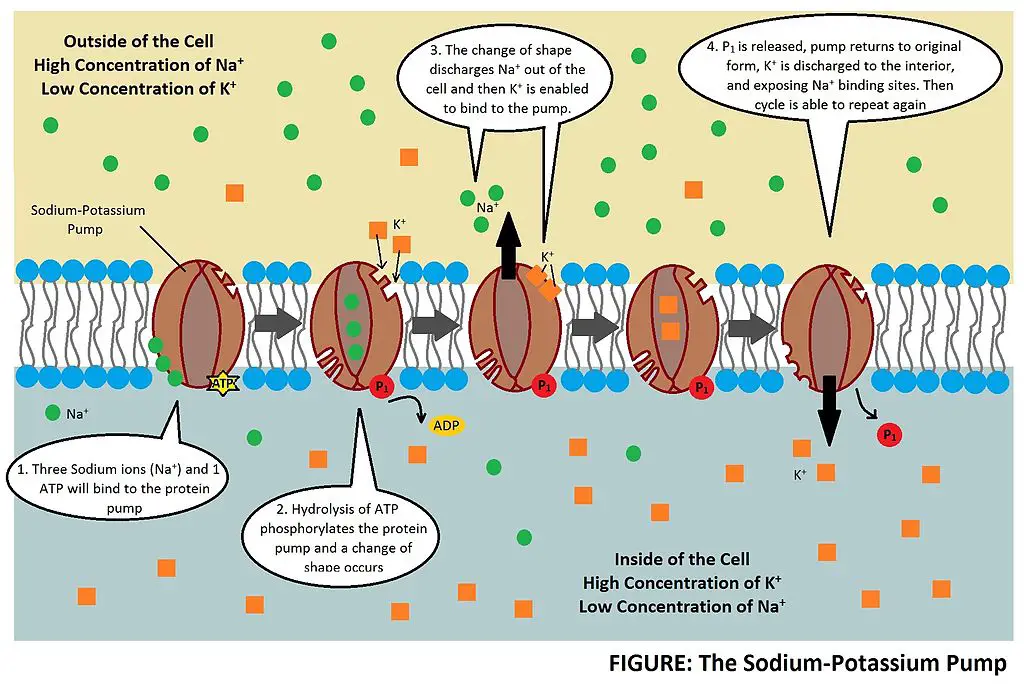
The imbalance creates the effect of a chemical battery – enabling electrical nerve impulses to pass through the body from and to the brain, and telling muscles to contract or relax.
Why do rabbits need magnesium?
Rabbits need magnesium because their parathyroid glands need magnesium – and the the parathyroid glands help make bones, and control how much calcium is in the body through creating hormones.
The more calcium in the diet, the more magnesium a bunny needs. So make sure that your rabbit is not getting too much calcium.
One sign that your bunny might not have enough magnesium in their diet is fur chewing (though this can also be caused by not enough fibre in the diet, or by other non-diet related reasons, like stress).
Make sure that you are giving a balanced diet to your rabbit if you see this happening, and if you are worried check it out with a vet.
Why do rabbits need micro-minerals (copper, iron, and others)?
Rabbits need micro-minerals like copper, iron, manganese, zinc, selenium, cobalt and iodine for a whole range of different purposes, including blood production, growth, hair formation, enzyme production, and energy metabolism. Let’s take each in turn.
Why do rabbits need copper?
Rabbits need copper to help make hair, collagen and to regulate how the body uses iron and creates energy. If bunnies don’t get enough they may suffer from anaemia, dermatitis and bone marrow problems.
Why do rabbits need iron?
Rabbits need iron to help make blood. Red blood cells are made up of haemoglobin, a complex protein connected to an iron complex.
When rabbits breathe in, oxygen goes into their lungs, then sticks to the iron ion in the haemoglobin. The blood then takes the oxygen all around the body so it can be used.
If bunnies don’t get enough iron, they can suffer from anaemia. The rabbit may be lethargic, or weak and dizzy.
Other illnesses and conditions can also cause anaemia, so if you suspect your rabbit is anaemic, speak to a vet.
The normal amount of iron in rabbit’s blood is 33-40 mmol/litre.
Why do rabbits need manganese, zinc, iodine, cobalt and selenium?
Rabbits need the minerals manganese, zinc, iodine and selenium for a whole variety of reasons.
Many enzymes use zinc, and it is also involved in cell division. Amino acids (the building blocks of proteins) need manganese.
The thyroid gland (that looks after energy production) needs iodine. Without it, the thyroid gland gets bigger to try to compensate – goiter.
Rabbits need selenium in very small amounts. Most mammals use selenium to mop op peroxides (free radical compounds which are by-products of your body working) which could otherwise damage cells. But bunnies mostly use Vitamin E to do this.
Finally, bunnies need cobalt to enable them to make Vitamin B12.
Why do rabbits need vitamin A?
Rabbits need vitamin A (a fat-soluble vitamin, also called retinol) to keep their bodies healthy. It is important for their skin and immune system. Bunnies also use vitamin A to keep their eyes healthy and able to see in poor light (find out more about how rabbits see the world). Bunnies can’t make vitamin A themselves, so they need it in their food.
Foods that contain vitamin A include dark, green, leafy vegetables. Grass and hay also contain vitamin A (though the drier the hay, the more likely it is to have lost some). This is why it’s a good idea to give your bunnies some greens every now and then along with hay and fresh water.
Why do rabbits need vitamin D?
Rabbits need vitamin D, a fat-soluble vitamin, because it controls how they absorb calcium and phosphorus, both of which bunnies use for bone growth. However, rabbits differ from other mammals in how they use vitamin D because they are unique in how they process calcium. Rabbits can get vitamin D both from hay and from daylight.
Most mammals need a special protein that latches onto calcium in the diet, and vitamin D helps make this protein. But rabbits are different. They don’t need this protein, but extract highly efficiently all the calcium in the diet.
This is why you need to be careful that your bunny doesn’t have too much calcium – the extra that isn’t needed can form a sludge in their kidneys, and lead to painful kidney stones and chalky urine.
But if the diet doesn’t have enough calcium, then the vitamin D kicks in and helps to increase how much calcium your bunny can get from the food.
Vitamin D still helps make sure that rabbits have the right amount of calcium in the blood stream, and whether there is too much that needs to be excreted.
Vitamin D also controls phosphorus uptake. A major component of bones is calcium phosphate, so vitamin D is vital for proper bone growth.
You can make sure that your bunny has enough vitamin D in two ways.
First, some foods contain vitamin D. This includes hay, which should always be the main part of any rabbit’s diet. Grass contains ergosterol, and when this dries to hay in the sun, the ergosterol is converted to vitamin D.
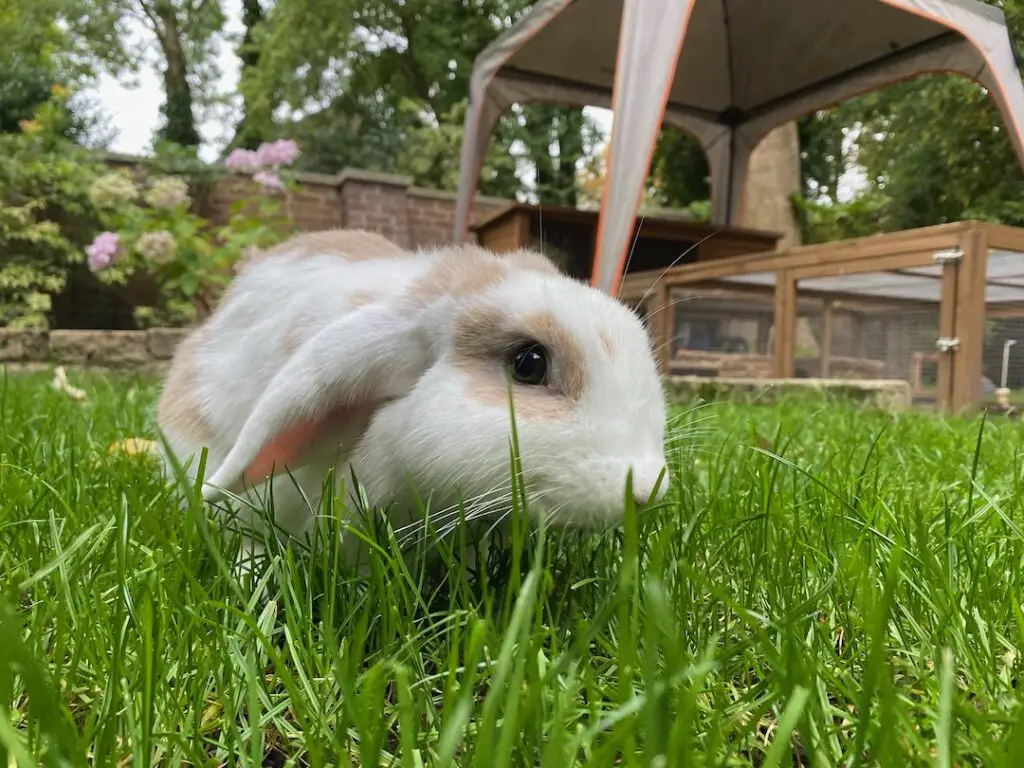
Secondly, just like humans, rabbits can get vitamin D from being out in the sun. In particular, it is UVB rays that help bunnies manufacture vitamin D from the action of the UV rays on their skin.
Some bunnies spend most of their time inside. If that’s true of your rabbit, just make sure that they have a varied diet including hay that will provide vitamin D.
However, you also need to make sure you don’t give too much vitamin D to your rabbit – too much is toxic to bunnies.
If rabbits overdose on vitamin D, it can lead to them losing their appetite, kidneys and arteries hardening, and poorer movement.
Because of this, it is usually best not to use a vitamin D supplement, but to rely on vitamin D naturally occurring in a balance diet (unless you have been specifically told otherwise by a vet).
As always, if you have any concerns, check with a vet.
Why do rabbits need vitamin E?
Rabbits need vitamin E, a fat-soluble vitamin, to keep their muscles and immune system healthy. Their bodies (and ours) produce dangerous types of molecules called free radicals when they make energy (eg to move muscles). left alone, these free radicals react with cells in the body, damaging them. Vitamin E, an antioxidant, helps mop up these free radicals and keep bunnies healthy.
If rabbits don’t get enough vitamin E, it affects their muscles (muscular dystrophy). This can include their heart muscles.
why do rabbits need vitamin K?
Rabbits need vitamin K, a fat-soluble vitamin, to keep their blood clotting. Without vitamin K, a cut could continue to bleed. Bunnies produce most of the vitamin K they need themselves, but occasionally (for example if a bunny is pregnant) they may benefit from additional vitamin K.
If rabbits have too much vitamin K, it can affect their kidneys (nephritis).
Do rabbits need vitamin B?
Rabbits do not need any of the vitamin B complex in their feed. Bunnies can produce all the different types of vitamin B themselves. When they eat their food, the processes in their intestines create vitamin B. Bunnies then create a special type of poo (caecotrophs, which are shiny, soft, smelly small poos joined together). They eat this straight away (which is why you rarely see this type of poo), and so can absorb the vitamins they need.
Do rabbits need vitamin C?
Rabbits do not usually need any vitamin C (ascorbic acid) in their feed. Bunnies can make vitamin C in their livers.
Rabbits only benefit from additional vitamin C when they are in stressful situations – for example, if it is extremely hot.
What is a healthy diet for a rabbit?
A healthy diet for a rabbit consists mainly of good quality hay (like Timothy hay) and fresh water. You can give rabbits as much hay as they want. Fresh water is important – if rabbits don’t have enough water, they won’t eat enough hay.
Additionally, bunnies benefit from a handful of fresh greens each day. Our bunnies love coriander, but it is good to mix it up.
You can also give your rabbits a small amount of rabbit pellets each day – typically about an eggcup-full.
Occasional treats are also fine, such as cut up apples, bananas, and small amounts of carrots.
A varied diet like this should supply all the fibre, protein, energy, vitamins and minerals that your bunny needs for a healthy life.
Should I give vitamin supplements to my rabbit?
You should not need to give vitamin supplements to your rabbit unless you have been told to by a vet for a specific reason. A healthy diet should provide all the vitamins and minerals that your bunny needs.
Giving vitamin supplements unnecessarily may be bad for your rabbit. Having too much of certain vitamins (eg vitamin A and vitamin D) can be toxic for your bunny, leading to a variety of health problems.
And rabbits do not normally need vitamins B or C at all.
How can I tell if my rabbit is overweight or underweight?
The easiest way to tell if your rabbit is overweight or underweight is looking at their body shape from above. The Pet Food Manufacturer’s Association have produced a handy visual guide to download.
Check out these other posts…
As you’re interested in your bunny’s nutrition, have a look at these other posts:
- The digestive system of rabbits
- What fruit can my rabbit eat?
- What herbs can my rabbit eat?
- Can rabbits eat apples (including apple cores)?
- Can rabbits eat mange-tout?
- Can rabbits eat peas?
- Can rabbits eat swede (rutabaga)?
- Can rabbits eat radishes?
- Can rabbits eat rocket (arugula)?
- Can rabbits eat cucumber?
- Can rabbits eat grapes?
- Can rabbits eat cheese?
- Can rabbits eat bread?
- Can rabbits eat dog food?
- Can rabbits eat honey?
- Can rabbits eat almonds?
- Can rabbits eat pak choi (bok choy)?
- Can rabbits eat peanut butter?
- Can rabbits eat popcorn?
- Can rabbits eat guinea pig food?
- Timothy hay – what is it, why is it called Timothy, and why is it so good for rabbits?
- 14 amazing facts about rabbit teeth
References
The information in the nutritional table comes directly from the FEDIAF, which is the European pet food manufacturers’ association. The guidelines were drawn up by a range of veterinary professors working in a range of European universities and other experts. It is the most authoritative list in Europe.
The calorie requirements are based upon a formula within their guidelines. The intake refers to metabolisable energy.
Daily calorie intake (kcal) = 100 x (rabbit weight in kg)0.75
This energy intake is doubled for growing rabbits.
The guidelines are specifically for pet rabbits (you may come across some tables which are for people breeding rabbits for meat).
Other information comes from a range of sources, including:
Amy E. Halls (2010) Nutritional Requirements for Rabbits. Shur-Gain.
Pellet, S & Thompson, L. Hypovitaminosis D in rabbits.
Claire Speight (2017) “The nutritional needs of rabbits”. Veterinary Nursing Journal 32:144-46. DOI: 10.1080/17415349.2017.1284578

